8 Things to Know Before You Visit Argentina
Is Argentina safe to visit? How expensive is it? These Argentina travel tips from Buenos Aires local Martina will help you make the most of your time here.
Shares
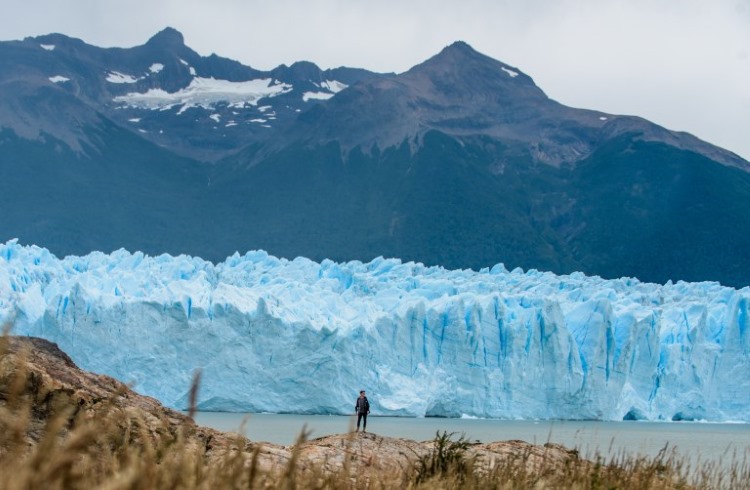 Photo © Sean O'Reilly
Photo © Sean O'Reilly
- How safe is Argentina?
- Is Buenos Aires safe?
- Is Argentina expensive?
- Money tips
- What is the best time of year to visit Argentina?
- Local public transport in Argentina
- Taking a taxi or an UBER
- Top places to visit in Argentina
1. How safe is Argentina?
Argentina is considered one of the safest countries in South America. Nonetheless, you should keep your eyes open when visiting cities like Rosario, Córdoba, or Mendoza. Petty crime rates in these cities are lower than Buenos Aires, but, for example, Rosario has been part of a drug-trafficking route for years, with increasing gang violence. Though this may not affect visitors, you should beware of suspicious situations.
Demonstrations in Argentina are common. Do your research before joining the crowds, and make sure it's a cause you identify with. And regardless of the occasion, prioritize your personal safety and stay in a spot you could easily leave if things get heated.
Small towns in the countryside are generally safe and secure, but you should use common sense and never leave your items unattended.
2. Is Buenos Aires safe?
It’s always wise to be cautious when wandering urban areas. Though Buenos Aires is generally safe for travelers, it’s important to stay alert, as robbery is all too common.
If you plan to explore neighborhoods beyond the well-traveled areas, research beforehand, talk to a local, or book a tour.
Caminito (in La Boca), Palermo, and San Telmo are popular with visitors, but even here, if you keep wandering, you can end up in a not-so-nice area. Beware of this, especially at night. By all means, steer clear of public parks after sunset.
In general, the wealthiest neighborhoods are those north of Corrientes Avenue, whereas some of the most impoverished areas are located south of Rivadavia Avenue. Unfortunately, poorer areas often have higher crime rates.
Wherever you go, avoid talking on your phone on the street, keep valuable items in your pockets, and don’t wear expensive jewelry – especially necklaces, as these are easy to rip off. Always wear your purse or backpack on your front.
If going out at night, call a taxi or take an UBER. Avoid standing by the bus stops or taking the subway when there's no one else around, as you could be putting yourself at risk.
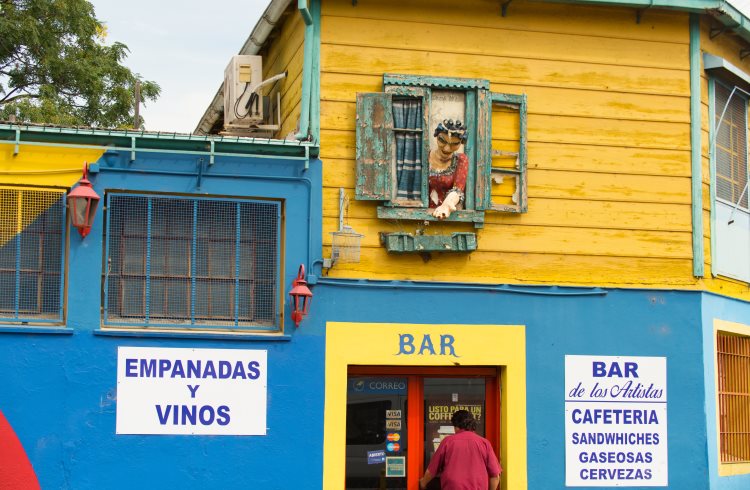
3. Is Argentina expensive?
In 2023, Argentina is quite affordable for those bringing in high-value currencies. If on a tight budget, expect to spend as little as US $20-25 per day, including hostel accommodation, cheap eats, and local public transport.
Patagonia and some other areas favored by travelers – including coastal towns such as Mar Del Plata and Pinamar, or iconic Iguazu Falls – are pricier. These destinations are always in high demand, both among locals and international visitors. Travel in remote areas can also be more expensive, as the transport of supplies becomes more difficult.
4. Money tips
Credit and debit cards are widely accepted. Still, many restaurants, grocery stores, or hotels only accept cash or require a minimum expenditure before they let you swipe.
As Argentina is always battling inflation, exchange rates and regulations change quite often. When planning your trip, make sure to find information updated within the past three months.
Always keep cash and small change handy. If you need more, simply withdraw from one of the many ATMs scattered around cities and towns. Whatever you do, be discreet, avoid flashing your wallet, and don't extract big amounts in one go.
A 10% to 15% tip is expected but not mandatory, especially when eating out.
5. What is the best time of year to visit Argentina?
As a rule of thumb, it's best to visit between September and April (early spring through the beginning of fall). In the end, it will depend on where you decide to go, as the weather varies from region to region. But from spring to fall, you can generally find good weather around the country.
If you dislike extreme cold, avoid June-August, especially if heading to Patagonia. If intense heat is not your thing, skip Buenos Aires and the central and northeastern regions during summer. Here, you can expect 90°F (32°C) on a "cool" day.
Winters in Buenos Aires are mild, with temperatures ranging around 55°F (13°C). But, as you approach the south and westernmost regions, it starts to get more and more chilly.
When choosing what to pack, don’t forget sunscreen, as the sun in Argentina is seriously strong. Also, remember to bring layers of clothing. Many travelers visiting for two to three weeks choose to fly around the country because it’s so big. So, if you’re heading from Buenos Aires to Patagonia, you’ll likely experience a big temperature change.
Layering becomes essential when approaching the Andes, as temperatures drop suddenly from day to night, even over summer. Rain gear comes in handy especially when touring the central and northwestern regions, as it can rain buckets year-round. On average, November is the wettest month, country-wide.
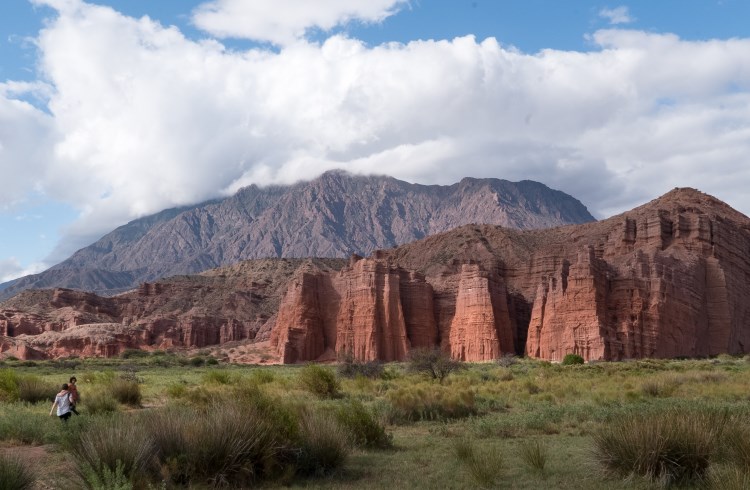
6. Local public transport in Argentina
Argentina has a massive and budget-friendly public transit network. The easiest way get around most cities is with a SUBE card, which you can purchase in lottery shops, train and subway stations, and kiosks. This rechargeable card is not valid everywhere, but covers major urban areas and over 30 other smaller localities.
As long-distance buses are the main means of transportation outside of Buenos Aires, intercity trains have been neglected for decades. But recently, there’s been a resurgence of the Ferrocarril, connecting 12 of the 23 Argentinian provinces. If you have time, the trains are a leisurely way to explore parts of Argentina that are off the beaten path, but be warned that they can be slow, are not very comfortable, and sometimes may not leave on time.
7. Taking a taxi or an UBER
Catching a taxi is very easy in any Argentinian city and surrounding localities. As a precaution, especially at night, always ensure your taxi is licensed and belongs to a "Radio Taxi" company.
Some taxis will display a sign on the vehicle's roof stating the company they belong to. If they don’t, and you decide to take it anyway, check out the taxi's registration information displayed inside.
Be aware, taxis around the country have different colors. In Buenos Aires, they’re black and yellow, in Córdoba they’re white, and so on.
UBER became officially legal to use in Buenos Aires in September 2020, so now you can ride with peace of mind. UBER's competitor, Cabify, is also available around the main cities.
8. Top places to visit in Argentina
Argentinian Patagonia, which covers nearly all of southern Argentina, is a must. As an avid traveler who loves to brag about her home country, I’ve yet to meet anyone daring to question the absolute beauty of this region, with its dramatic, snow-capped mountains, blue lakes, villages, glaciers, and incredible hikes.
Patagonian highlights include the Perito Moreno Glacier, Bariloche in the Lake District, Argentina’s hiking capital El Chaltén, remote Ushuaia at the tip of Tierra del Fuego, and Cerro Aconcagua, the tallest mountain in the Americas, in Mendoza (slightly north of the official start of Argentinian Patagonia).
A popular itinerary for road-trippers is a tour of the country's west, driving along Route 40. This drive skirts the Andes, and also covers the regions north of Patagonia – Cuyo and Northwest. The Andes is the longest mountain range in the world, and its southernmost stretch is home to the highest peaks in the Western Hemisphere, so be prepared for altitude sickness (as I learned the hard way).
Argentina's north offers a wholly different travel experience, ranging from the arid and striking landscapes of Salta and Jujuy, near Bolivia, to the country's very own New Wonder of the World, 269ft (82m) high, 1.6mi (2.7km) wide Iguazu Falls, in a lush rainforest along the Brazilian border.
Mendoza, in the Cuyo Region of the central-west, is famous for wine, but this sometimes-underrated region is also filled with otherworldly landscapes, like the Pampa Negra, a volcanic black desert in Mendoza Province, the moon-like formations at the Valle de la Luna, the windy flats of Barreal in San Juan, and the Grand Canyon-esque Sierra De Las Quijadas in San Luis.
Other standout natural landmarks in Argentina are the Esteros del Iberá, vast wetlands in Corrientes, and the wildlife-rich Valdes Peninsula in Chubut.
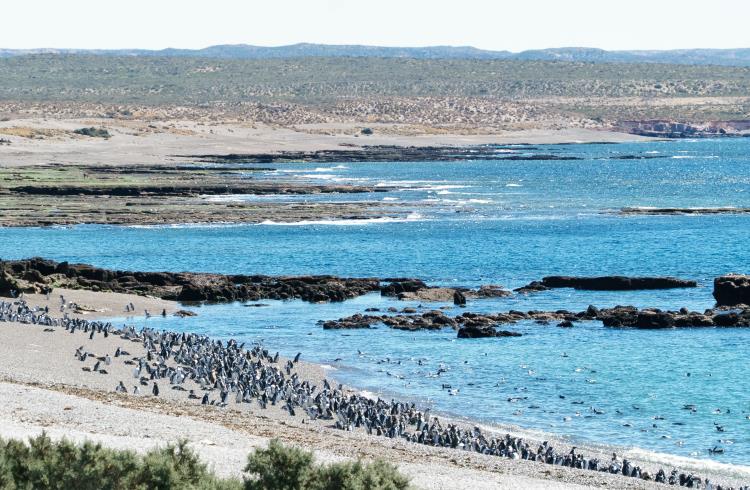
Travelers eager for a dose of urban life should know Buenos Aires has a reputation as a city that never sleeps. Museums, restaurants, nightlife, tango, and more make the Porteñian city sing. But Córdoba, Rosario, and Mendoza are also buzzing cities packed with activities, local culture, and great food. Try Rosario’s staple toastie – a carlitos – a traditional empanada Cordobesa, or a Mendozan classic such as humita en chala.
Related articles
Simple and flexible travel insurance
You can buy at home or while traveling, and claim online from anywhere in the world. With 150+ adventure activities covered and 24/7 emergency assistance.
Get a quote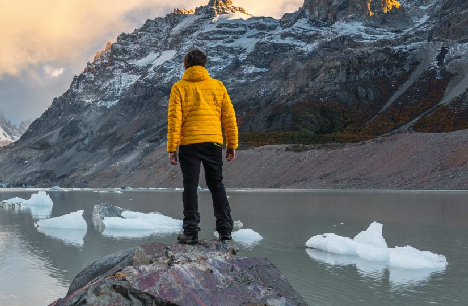
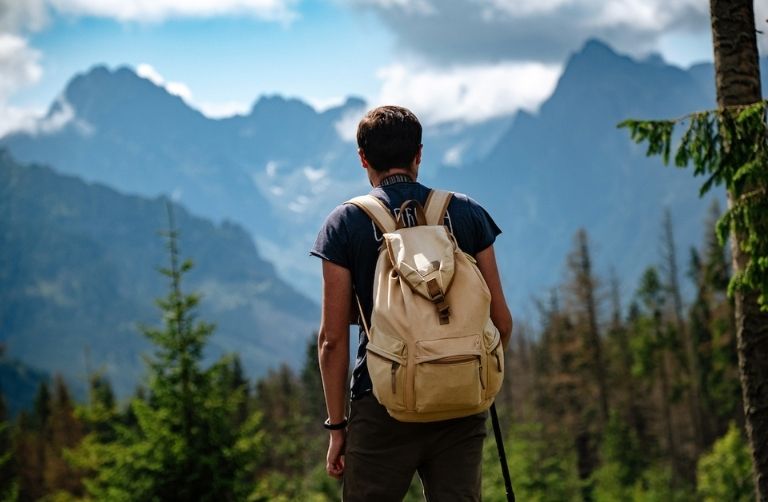
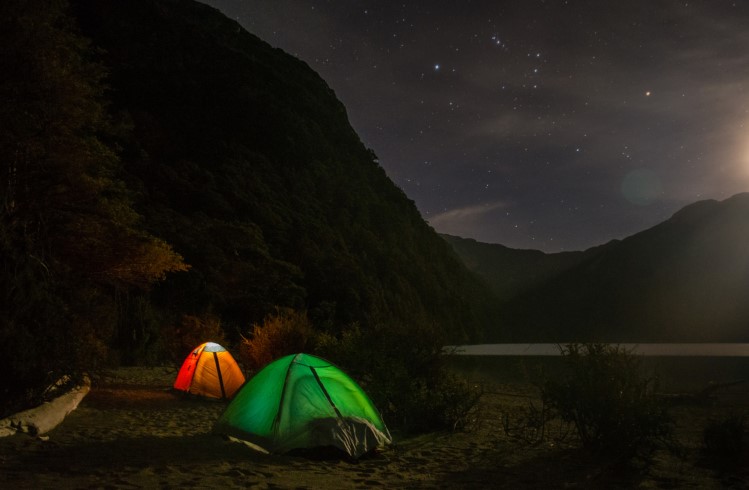
16 Comments
BA is not the same as it used to be. Argentina as a whole is also changing, too many poor people, gangs of thieves, loads of scammers, counterfeit money flows like water. You WILL get ripped off at some point, hopefully its only monetary and without violence. Inflation is out of control, the cost of everything is going thru the roof, so it's not surprising that the locals turn to ripping off tourists. Guaranteed that you will never pay fair price for anything, as soon as you are identified as "not local", you will pay 5x the price. Tourists are observed like sheep to a wolf pack. Sad but true. Also, in years previous, I went there on business, the Argentines are not the hardest workers I've come across. They have this expectation that they should live a certain lifestyle, but then not willing to put the time and effort in to earn it. They live with their hands out, expecting the Gov't to give them everything - free education, free health care, free childcare, subsidized housing. (To be fair, I must state that these are the urban populations I've been involved with in business, I've no experience with the country folks, just to be clear). Meanwhile, they can't elect a Gov't that isn't corrupt! Argentines have a very high opinion of themselves (you can see that by the comments they leave on here), they don't even identify as Latino's, but Europeans! They are critical of other Latino countries, but lack the ability to be critical of their own country, and will defend it no matter what facts you present (look on here how they don't accept that crime is rampant in BA, but instead deflect it "crime is a problem in all major cities". Well Duh!). They blame the Gov't for everything, yet it's them who elect the Gov't. Then of course, they blame the Americans, the European, the wealthy, everyone is out to "screw the Argentines". Don't get me wrong, Argentina is a incredible country, and the people are (or used to be) friendly, but the time to visit this wonderful country is on hold for the time being, IMHO.
I was in Argentina before the Covid-19
I had problems with taxis even the radio taxis. They have a little button that when you see your celphone or outside they put this button that increase the amountand suddenly you have to pay 3 times more than expected. Sometimes they even say that the taximeter is not working and they change completely the price of the travel so DON'T TAKE TAXIS.
This woman say that UBER is legal but it's not like that. They don't have passenger insurance in case of accident the don't have professional license, thay even don't drive they how cars so they don't care to much about nothing.
If you want a safe travel through the city or from the airport to the hotel or city tours i recommend contact ARGENTINA ELITE TRANSFERS AND TOURS. They are in the top in Viator , very polite, etc.
For me it was the best experience for me and my fathers.
If you come to Argentina stay AWAY from shitty Capital Federal (Buenos Aires) and go see the natural wonders we have in Patagonia instead. I have no clue as to why would someone choose to go around such an ugly, dirty city when you could instead be hiking on some of the prettiest places in the entire continent.
I will reiterate: Do yourself a favor, stay out of Buenos Aires. Chances are you'll get robbed as soon as someone notices you are a wealthier tourist.
Hamad, if I were to give you an opinion I would say things done change. The minimum salary is at its lowest in the century, due to the recession and the pandemic. This has obvious consequences in security, and overall living quality.
However, on a long term perspective, the country will bounce, as it always does. Just choose a city that adapts to your needs and preferences. I don't know them so I can't make recommendations, but this is a continent-like country, so there are wild differences between regions. You need to research deeply for medium-smaller cities, but they are a very nice option in my experience. If you can, avoid Buenos Aires and it's sorroundings.
What people fail to mention is that we shouldn’t have to be so careful. If visiting an area entitled that one has to have certain precautions then it means it’s not safe. Growing up and living in NYC I’m use to a city but I also know that if I decide to go out in the middle of the Ivey it is safe. Of course common sense should be used. Having people rob you at daylight by pointing guns or a knife shows it’s not very safe. Can drivers ripping people off isn’t a sign of a safe place. If visiting a country requires so much research and precaution it’s not worth visiting. I sure hope it improves. For now I’ve cancelled my trip to Buenos Aires.
I really love traveling to Argentina for visitation, How can i get the visa lottery form, And when is the form ending? I have checked on this site https://www.techsmoothy.com/argentina-visa-lottery/ but am not satisfied on what i want. Please admin more information. Thanks
I've traveled a lot. The most dangerous is the United States. you never know in which ghetto you will be abducted. people are stupid and think too well, the land is dirty and nature is not taken care of. I am planning to go to Argentina and I have no worries. A fool can be beaten in the church.
I was in BsAs and other parts ARG in 2009 and 2018. I've been ripped off and threatened and was nevertheless considering returning to live for 2-3 months to write on SA culture because of the amazing exchange rate (even better than the 20 pesos to $US 1 that existed in 2018). However, what is the point of having a great exchange rate if you get ripped off shortly (or anytime) after you get the pesos? If in the future I read that the government cracks down on taxi thiefs and other thugs, in a true attempt to draw back tourists and long-term visitors, I'll possibly reconsider. Now, I'll just go to Chile. The ARG thugs and the population as a whole need to know, as someone wrote, that they are shooting themselves in their own feet (and other more valuable body parts, I'd add) by mugging and endangering the very people who want to come in and spend money. Their own co-thugs need to crack down on them and I don't see that happening soon.
It's obvious that the people that wrote bad things about Argentina and BsAs are elitist people that hate their own country because people vote for Peronist candidates. Argentina started it's last economic crisis during the period of conservatist president Mauricio Macri, affecting mainly the middle class people.
I have traveled to many countries in the world and many times I've traveled BsAs and nothing have happened to me.
I have friends there, it's an amazing city.
By the way, the only place where I had problems was in the US, in New York and in Los Angeles where I got robbed
We love Argentina and have come back again and again, traveling everywhere. We absolutely love Buenos Aires and have never had a negative experience. EVER. The above comments do not reflect the reality of this beautiful country. We are also an elderly couple and one would think we would be targets. On the contrary, people have been kind, helpful and welcoming. I would not miss BA for anything, with its incredible art, museums, architecture, food and great people.
I am
A
Little worried about sooo ugly comments i am Argentinean. my family arrived here 1760. I have travelled the world a lot.. you can remember NYC before Giugliani, when taxis had blindex between drivers and passengers. We are passing a terrible exonomic
Moment. The peronist party are difficult to get rid off. BA is nowadays not the safest city, specially when tourists want to experience how the less privilege people live, like visit to favelas in Rio de Janeiro. People are very friendly. If you see somebody with a city plan, mostly everybody will try to help. . But there is quite more to see than BA. And if comments here say “it can be pricey” it is because it is worth. May be some in this chat want to travel for free. And of course you have to be
Careful like everywhere in the world. Things concerning Rosario are true. Stay at nice neighborhoods that are safe. And travel all over Argentina. We have an outstanding country.
As I sit here in Buenos Aires reading these comments I feel embarrassed. As a USA national (we all are in the Americas remember.) with an Argentine wife I can see both sides. Also living in Detroit in the 1960s I know what bad neighborhoods are like. I absolutely love Argentina and it has so, so much potential. For now, politics are holding it back. But, where in the world are politics doing anything great? We come at least twice a year and stay on average 6 months. Yes, having a Buenos Aries born, Argentine wife is a massive benefit. But general careful behavior has avoided trouble as with any place in the world. My wallet was pickpocketed in Moscow, so I learn the hard way after being warned by my wife many, many times.
Visiting Argentina from Ushuaia to Salta, I am in constant reminder, be it North America, Central America or South America, no place is perfect or 100% safe. But they have so much in common. It can’t dampen my love for Argentina nor my optimism that things will get better. Example, Columbia in the 1980s when I could never leave the car, to today, with a bustling happy population and expanding economy. Not perfect, but not as self destructive as it was. I know Argentina will have the same kind of awakening again. It is too beautiful and big to not.
Dave Chambers Post is Horrible , He is definitely the most prejudice man i have ever seen post anything . I Worked with Argentinian's that Came to the US. They are the Very Hard Workers. They also Have a Good Ethical Code as Well . Every country has people that are Lazy And Raciest. They However make up a Small majority of the country they inhabit. I Can Tell you From my 56 Years The U.S. Has 59 Million Americans Getting Welfare on a Monthly basis. That's 19 % of the population about 1 in 5 people. While A lot of people receiving benefits do not have a choice. A very high number are freeloading on our TAX Dollars
An Argentinian mountain town might be better than what is happening in the U.S right now. I am thinking about moving out of here to some where that has not lost it's mind! Thinking of taking a trip to Bariloche or Angostura....not sure it is better but looking into it!
Hello, everyone!
After reading some comments, and seeing some generalizations, I'd like to offer some clarifications.
I will give some context first, so you can get I sense of who I am, I'm from Argentina. I'm 37, am I wife and mother.
I haven't always lived here.
I was a 3rd culture kid growing up and only returned home for good, when I was 21.
I've lived in Copenhagen, Tokyo, and Pretoria (South Africa).
First of all, I'd say I do identify as Latin American, and can honestly say that it really depends on where you look...
there are hard working people here too... I find it offensive that be a generalized conclusion that we are all not hard working, I get it a lot of people as the government for anything under the sun, it is ridiculous... I completely agree, but that doesn't represent everyone, as of now even young people (some, but growing in numbers) that have unfortunately grown up in this reality are starting to get the importance of not asking for hand outs... I want to make it very clear, I'm not saying this isn't a problem, I'm saying some people in 2001 unfortunately were lost... I don't how else it say it.
There are lots of other people working full time and also studying, people are not all the same, anywhere.
As for people ripping tourists, I've always being embarrassed by that, and it does happen.. Negotiate. if the price is ridiculous, let the competition begin, "ni en pedo, es muy caro" and start negotiating...
I've been to many other places, apart from the countries I have lived in, and even though I am aware it is not a perfect place, I can assure you it is worth the visit... for empanadas I suggest "La cocina" Pueyrredon (caba)
for pizza there many places depending on your preference (thick, thin crust, lots of cheese...) I would research, depending on your preference, and go to Av. Corrientes and buy a slice in a few place, based of the list... Ice cream is pretty good here too, Persicco, Freddo, Rapanui, there are ice cream boutiques that have quality ice cream around the city too... there is also so so ice cream... I would start with Persicco, Rapanui, then Freddo... research, there is a lot of variety in quality, but the good one are really worth it, in my opinion. Same goes for pastries, pasta, and parillas... for an asado, I'd start with Cabrera, in Palermo, but of course there are hidden gems throughout the country.
One thing that I must mention, unless you are looking for something specific, or are traveling with kids, malls are pretty small, and sometimes more expensive.. some have activities for kids, but not sure they are worth it if you are not traveling with Little ones, or unless you know something you want is found there. Mendoza is beautiful, Córdoba is beautiful, the south is beautiful, the Iguazú, Salta, there are plenty of places to travel to outside BA, I can't name them all.
I would wholeheartedly, recommend anyone thinking about visiting, to consider it seriously... there really are good people and people who are questionable anywhere, the country is objectively speaking very beautiful, the food is very good, and the people are warm (the right people, that is) and right now, it is very affordable.
Hi Martina and thanks for your very complete and accurate article, and some of the pictures are really original and also funny. I´m coming with some new fresh air and I will try to change the topic, coming back to travelling related info. If you allow me, I would like to add a few great attractions me and my family visited when we stayed in Buenos Aires in December 2023 for almost a month. I highly recommended travelling 60 km to the Children’s Republic – La República de los Niños -, the first themed amusement park in the American continent that inspired Walt Disney to build Disneyland. The place is really huge and it takes a whole day to cover it. I also would like to suggest stepping back in time onboard the Historic Tramway, a trip to the Caballito neighborhood, inside Buenos Aires City. The trams are real moving museums – they are between 80 and 120 years old – and as they travel you can see well-maintained historic mansions, unique tree grove, and boutique hotels. And my last suggestion is visiting a vineyard just 80 km from the city – and save a 1000 km trip to Mendoza, the province where the main wines are produced -. In that vineyard, we enjoyed a day in the country, including the tasting of their own wines, as well as a great argentine lunch. I advise finding a guide or an agency that can put all these attractions together. We found a friendly family who organizes all these tours and trips according to our interests. They are “Kangoo Tours Buenos Aires”: https://kangootours.wixsite.com/tours